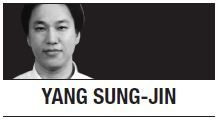The much-awaited video game console Nintendo Switch was released in South Korea on Friday, along with a handful of titles including “Super Mario Odyssey,” the latest installment of the popular Super Mario series.
On the launch day, I rushed to a shop nearby to buy the portable console and “Super Mario Odyssey.” I was luckily able to snag one, and as soon as I got home, I turned on the machine and jumped right into the virtual wonderland where I could meet Mario, Luigi and Princess Peach.
The story of “Super Mario Odyssey” remains largely the same as other installments of the hit franchise: Mario, a lovable Italian plumber, and Cappy, a spirit that possesses his hat, embark on an adventure filled with peril and puzzles to save Princess Peach from the villainous Bowser.
As I got Mario running around haphazard traps and throwing Cappy at cute enemies, I could not fight back a torrent of memories bursting in my mind -- memories about what I did in 1996 when I first came across the Nintendo console and Mario character.
At the time, I played “Super Mario 64,” “Mario Kart 64” and “The Legend of Zelda: Ocarina of Time” on the Nintendo 64 game console, named for its 64-bit central processing unit. The games were well designed in a way that got me to play for hours, often unaware of what was happening around me. And I still have the dust-covered Nintendo 64 and titles somewhere in a storage room.
Back to the Switch. Although Nintendo has incorporated innovative features into the Switch, it preserves the gaming format and storytelling style for its die-hard fans around the globe. Mario still jumps up and down to solve puzzles and players get the sheer fun of playing the pudgy character.
Let’s switch the topic for a bit. On Nov. 28, Korean game publisher Netmarble launched “TERA M,” another cookie-cutter mobile role-playing game based on the eponymous PC title. Since the original “TERA” was developed by Bluehole, now globally famous for blockbuster hit game “PlayerUnknown’s Battlegrounds,” some Korean fans had high hopes for the mobile edition. But their hopes were quickly dashed as it turned out to be just another “gacha” game.
“Gacha,” a term originally used for Japanese toy machines, refers to a monetization technique in free-to-play games. The majority of Korean mobile games rely heavily on the gacha system for monetization. Players have to pour real money into the titles to get more powerful weapons and equipment, as the system is like a lottery where the win rate is extremely low.
Korea’s top three game developers -- Netmarble, Nexon and NCSoft, collectively known as 3N -- are notorious for churning out one gacha game after another. Their profits are soaring for the gaming system not so different from a slot machine.
Gamers, especially those with disdain for such gambling-like system, try to stay away from mobile titles from 3N and criticize the excessive monetization scheme that wipes the fun out of games.
Just to check out the title myself, I played “TERA M” for a couple of hours on my iPhone 6S Plus. The game has another distinctive feature that has been universally adopted by Korean developers -- automatic play. I just had to watch my character go here and there, receive some quests and fight enemies. The only thing I could do manually is bet on the exploitative equipment gacha system to make my character stronger. Disappointed, I deleted the game.
The problem does not stop there. Adult players have every right to gamble away their money on the mobile games to build up more powerful characters. What’s troubling is that such gambling is now being broadcast via popular video platforms here.
You can watch Korean streamers, or “broadcast jockeys,” play in front of tens of thousands of viewers across the nation online. They often spend huge sums of money to get just a couple rare game items. In extreme cases, streamers engage in gacha lotteries during their broadcast, indirectly encouraging viewers to follow suit if they want to make their characters stronger.
There is also widespread speculation that some game developers are paying streamers to play the gacha games to influence other gamers in joining in on the gambling fun. There is no hard evidence yet, but it’s hard to imagine that local streamers are so fabulously rich to spend tens of thousands of dollars on each new mobile game on the market.
The other day, I saw one of the popular mobile game streamers referring to a “sponsor” on live broadcast. He quickly took back his comment, but many viewers raised questions about the possible collusion between streamers and game developers to encourage people to spend their money on mobile games built around the gacha system. Since Koreans sell and buy gaming accounts by paying real money, the current gacha system is nothing more than gambling.
I personally do not agree that gaming is inherently bad. But the gacha system in which players have to pay a lot of money to build up their characters is far from desirable.
Worse, a growing number of people are watching streamers gambling away their money on mobile games via YouTube, a platform used by millions of Koreans, including minors. Policymakers should come up with measures to protect young people from the rampant gambling broadcasts disguised as gaming content on YouTube and other video platforms.
Meanwhile, on the weekend, I will invite my 7-year-old niece to play “Super Mario Odyssey” together on the Switch, since the Japanese game title is still void of any corrosive gambling element.
By Yang Sung-jinYang Sung-jin is the multimedia editor of The Korea Herald. He can be reached at insight@heraldcorp.com — Ed.






